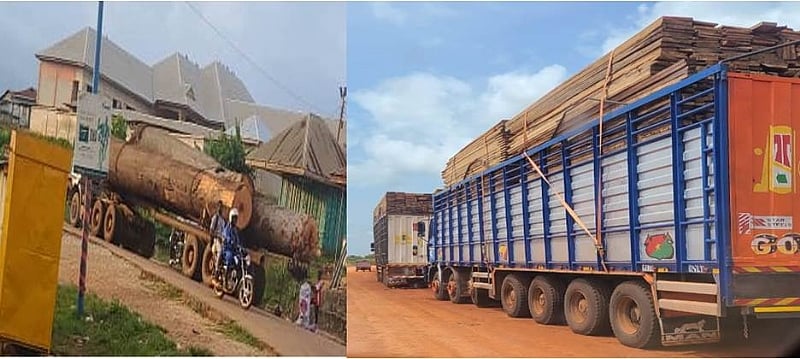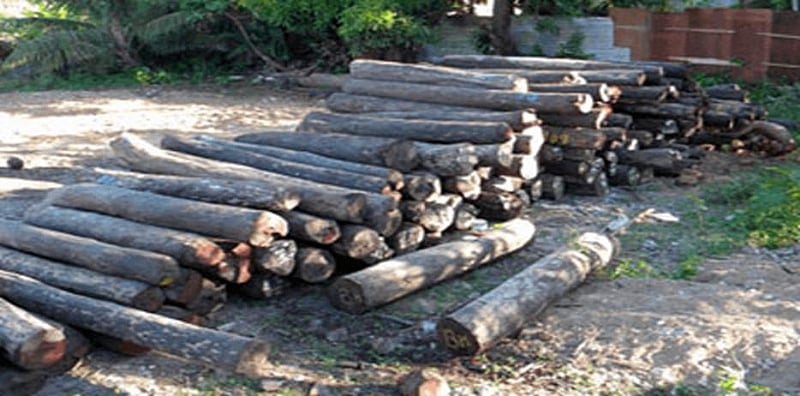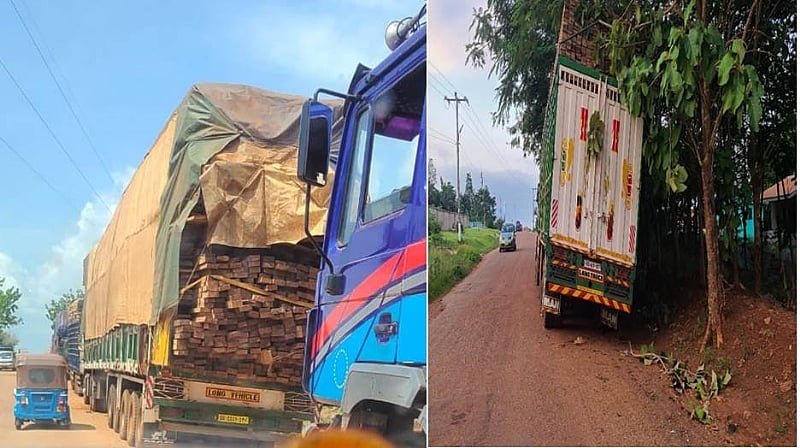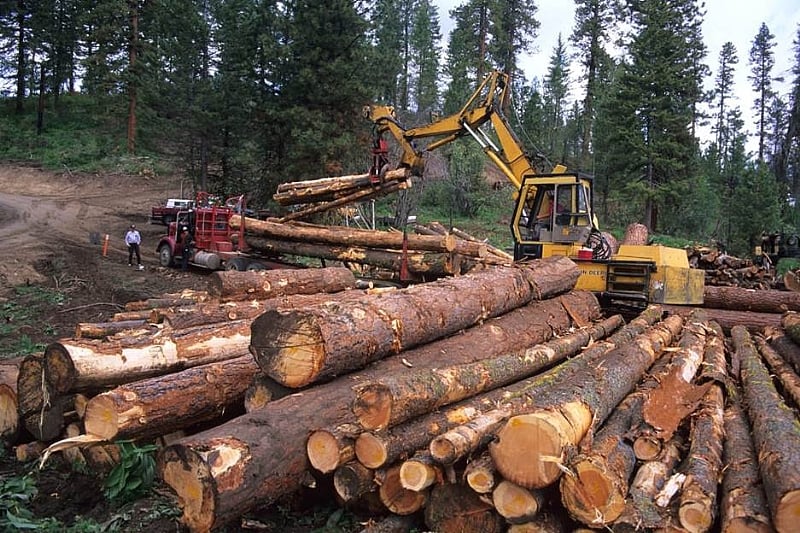SWEFWI, Ghana – In the quiet of dawn, Nsawura, a suburb of Sefwi in the Western North Region of Ghana, no longer awakens to birdsong. Instead, it stirs to the mechanical groan of overloaded timber trucks carving paths through once-green corridors of the Western North Region. The shade trees are gone. The breeze replaced by dust. The roads, riddled with gullies, bear witness to the weight of an illegal enterprise that gnaws at Ghana’s forest soul.
Across the Western North, Ahafo, and Bono regions, Ghana’s forests are vanishing, felled not only by chainsaws but also by greed, weak enforcement, and political complicity. What remains are broken ecosystems, devastated ommunities, and a timber trade whose shadow economy is quietly feeding illicit financial flows (IFFs) and robbing Ghana of both revenue and resilience.
 ___ Timber trucks transits through Goaso, a common sight by residents in the area
___ Timber trucks transits through Goaso, a common sight by residents in the area
Vanishing tax revenues
Ghana’s timber industry has been hollowed out by illegal activities. While hardwoods like rosewood, teak, and mahogany remain in high demand across Europe, Asia, and the Middle East, much of the trade now operates in the shadows. According to Global Forest Watch (2023), Ghana lost over 1.4 million hectares of tree cover between 2001 and 2021. The culprits? Rampant unregulated logging and institutional weakness.
Estimates from Global Forest Watch indicate that Ghana loses approximately 2% of its forest cover annually. At the same time, Forest Trends reports that illegal logging robs Ghana of over US$200 million in timber-related tax revenue vanishing into black-market channels. These are funds that could build schools, hospitals, and water systems. Instead, they are funneled offshore through shell companies and illicit financial networks. Timber harvested illegally is laundered into the legal supply chain with the complicity of corrupt forestry officers and unchecked transporters.
“Most chainsaw operators operate outside of forest management laws. They harvest all types of timber, including restricted species, use unauthorized routes, evade traceability systems such as the Ghana Wood Tracking System (GWTS), and make no payments to the government. This is not only an environmental threat—it is also a form of economic sabotage.”- Says Samuel Appiah Adane, Timber Trafficking Project Coordinator, A Rocha Ghana
Ecological disruption
Illegal logging isn’t merely a numbers game; it’s a biodiversity crisis. Professor Alfred Oteng-Yeboah, a retired professor of Environmental Biology, explains, “When you cut a tree illegally, you’re not just removing shade. You’re disrupting the entire ecology. Trees act as carbon sinks, support aerial life like birds and insects, and feed groundwater that becomes river sources.”
 ___ Freshly felled wood logs lie abandoned on forest soil
___ Freshly felled wood logs lie abandoned on forest soil
Nsawura resident Edward Dadzie sees the consequences up close. Illegal operators, he says, often destroy cocoa farms and food crops when felling trees. “They pay the farmer and just destroy the whole farm,” he says. “There’s less food, damaged cocoa yields, and no compensation for communities. Only the loggers benefit.”
And the damage doesn’t stop there. Timber trucks overloaded with logs often break down on narrow roads, often causing fatal traffic accidents. Water sources become contaminated, and flooding increases as tree cover disappears.
 ___ Faulty timber truck blocks major roads in forest corridor
___ Faulty timber truck blocks major roads in forest corridor
Socio-economic fallout
Beyond the ecological loss, the social costs are severe.
“Illegal timber harvesting deprives communities of vital funds for development project,” says Appiah Adane. “When the forest is destroyed, communities lose on multiple fronts. Whiles legal operators contribute through Social Responsibility Agreements, illegal operators pay nothing. They exploit the resources, pocket the profit and leave nothing only destruction.”
The loss of timber is tied directly to illicit financial flows (IFFs). Environmental crimes like illegal logging create unregulated revenue streams that bypass state oversight, feeding corruption and offshore laundering.
A 2024 academic study by Tropenbos Ghana and CSIR-FORIG confirms that Ghana’s informal timber sector suffers severe revenue losses due to illegal activities. These IFFs deprive the government of taxes, rob communities of development, and deepen rural poverty.
“This is organised crime,” says Professor Oteng-Yeboah. “It’s not just cutting trees; it’s a theft of national resources.”
System designed, but defied
Ghana’s legal framework, from the Timber Resource Management and Legality Licensing Regulation (LI 2254) to the Ghana Wood Tracking System (GWTS) is robust on paper. It mandates documentation from harvest to export: Timber Utilization Contracts (TUCs), Log Measurement and Conveyance Certificate (LMCCs), inspection certificates, and export permits. Yet, the illegal trade thrives by bypassing these checks through bribes, weak enforcement, and unapproved routes.
“In towns like Sankore, Nomekor, and Abuom, illegal timber is trafficked daily,” says a veteran driver from Goaso. “They overload the trucks, cause accidents, and even intimidate people who speak up.”
Enforcement paralysis
At the heart of the matter lies enforcement paralysis. While the Forestry Commission, particularly its Timber Industry Development Division (TIDD), works to track wood movement, its staff are under-resourced and overstretched.
“At times, their ability to conduct monitoring visits across operational areas is constrained by inadequate logistics, such as vehicles,” notes Samuel Adane”
“Even more concerning is the disconnect between the Commission and other enforcement agencies. “Police and Customs officials are often not adequately informed about what constitutes legal timber documentation,” he adds. “There is a clear need for institutional training and stronger cross-sector collaboration.”
The challenges facing the Commission are not just logistical but structural. At the inauguration of the Forestry Commission Board, Chairman Professor Martin Oteng-Ababio acknowledged severe internal constraints: underfunding, inadequate logistics, technology deficits, and capacity gaps. Externally, he cited political interference and the over-politicisation of forest governance as key barriers to enforcement. These dysfunctions, he warned, were fueling illegal logging, undermining personnel safety, escalating land conflicts, and worsening the climate crisis.
Worse still, allegations of political interference plague the sector. “Sometimes the financiers of illegal logging are the ones leading the trucks,” one source says. “They signal the officers at checkpoints — and they pass with a salute.”
Legal action
Illegal logging’s link to illicit financial flows is direct and dangerous. The more timber is cut outside legal channels, the more revenue Ghana loses, and the harder it becomes to track the movement of wealth gained through environmental exploitation. The result is a bleeding forest economy with no surgical tools to stitch the wounds.
This isn’t just about forests, it’s also about national integrity.
The EU-Ghana Voluntary Partnership Agreement (VPA) aims to bring sanity through the introduction of FLEGT (Forest Law Enforcement, Governance and Trade) licenses. Though not yet in full effect, civil society groups like Rights and Advocacy Initiative Network (RAIN) and Tropenbos Ghana are optimistic.
“The GWTS is a key tool developed to operationalize the Voluntary Partnership Agreement (VPA) by ensuring the traceability and legality of timber throughout the supply chain” says Samuel Adane. “It’s already helping improve documentation and traceability.”
But time is running out, and a sense of urgency is growing. In response, a coalition of CSOs including A Rocha, EcoCare Ghana, and Civic Response is already threatening legal action against the government over unauthorized concessions in protected biodiversity areas.
Community engagement
Both Professor Oteng-Yeboah and Appiah Adane agree that policy alone cannot solve this. Community engagement, public education, and economic alternatives for youth are essential.
“When young people see a tree, they don’t see biodiversity,” says Oteng-Yeboah. “They see income. And if they’re not caught, they make a living out of it.”
Despite its scale, illegal logging in Ghana remains underreported, overshadowed by the fight against illegal mining, or “galamsey.” Many stakeholders insist the crises are similar – both involve environmental degradation, community suffering, and millions lost in IFFs.
“Just like galamsey, timber trafficking involves crime, politics, and greed,” says Yaw Appiah, a resident of Goaso who has witnessed illegal timber operations firsthand.
The project received support from the Thomson Reuters Foundation through the Media Foundation for West Africa (MFWA) as part of its global work aimed at strengthening free, fair and informed societies. Any financial assistance or support provided to the journalist has no editorial influence. The content of this article belongs solely to the author and is not endorsed by or associated with the Thomson Reuters Foundation, Thomson Reuters, Reuters, nor any other affiliates.
Nana Ntiako Dacosta
Investigative & OSINT Journalist


